十四行诗赏析---辛苦整理!
- 格式:docx
- 大小:74.46 KB
- 文档页数:35
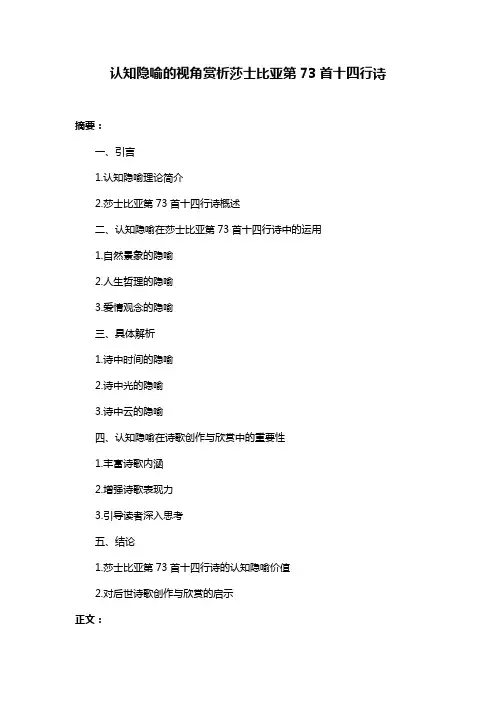
认知隐喻的视角赏析莎士比亚第73首十四行诗摘要:一、引言1.认知隐喻理论简介2.莎士比亚第73首十四行诗概述二、认知隐喻在莎士比亚第73首十四行诗中的运用1.自然景象的隐喻2.人生哲理的隐喻3.爱情观念的隐喻三、具体解析1.诗中时间的隐喻2.诗中光的隐喻3.诗中云的隐喻四、认知隐喻在诗歌创作与欣赏中的重要性1.丰富诗歌内涵2.增强诗歌表现力3.引导读者深入思考五、结论1.莎士比亚第73首十四行诗的认知隐喻价值2.对后世诗歌创作与欣赏的启示正文:一、引言认知隐喻理论是认知语言学的一个重要分支,它认为隐喻不仅仅是修辞手法,更是人类思维和世界认知的一种方式。
莎士比亚的第73首十四行诗(Sonnet 73)以其独特的艺术魅力和深刻的哲学内涵,成为了众多研究者探讨的焦点。
本文将从认知隐喻的视角,对这首诗歌进行深入赏析,以期为莎翁诗歌的解读提供新的视角。
二、认知隐喻在莎士比亚第73首十四行诗中的运用1.自然景象的隐喻在诗中,莎士比亚运用了丰富的自然景象进行隐喻。
例如,“In the middle of the night,/ When stars throw down their bright rays”,这里的“星星”隐喻为具有生命力的存在,寓意着诗人对生命和光明的追求。
2.人生哲理的隐喻莎士比亚在第73首十四行诗中,通过对时间、生命和死亡等主题的探讨,表达了他对人生哲理的思考。
例如,“Time,thou growest old,/ And I grow old with thee”,这里的“时间”隐喻为一位有生命的存在,体现了诗人对时间的感慨和对生命的无奈。
3.爱情观念的隐喻在这首诗中,莎士比亚还表达了他独特的爱情观念。
例如,“As a cloud departeth from the summer sky”,这里的“云”隐喻为爱情的短暂和易逝,表达了诗人对爱情的哀婉和对永恒的向往。
三、具体解析1.诗中时间的隐喻在莎士比亚的第73首十四行诗中,时间是一个重要的隐喻主题。

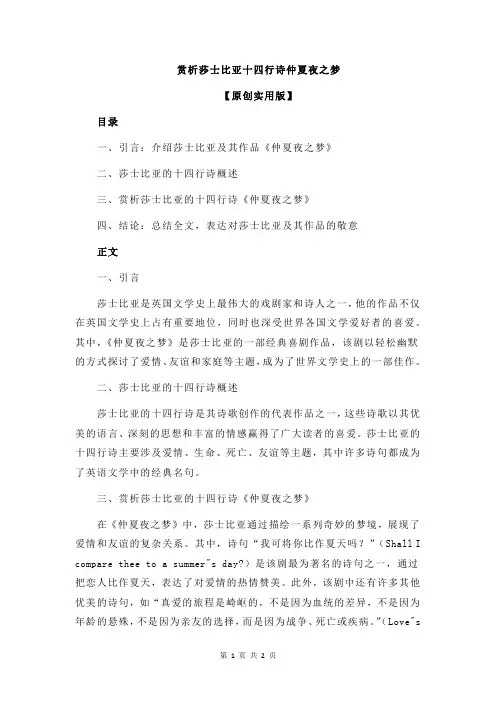
赏析莎士比亚十四行诗仲夏夜之梦【原创实用版】目录一、引言:介绍莎士比亚及其作品《仲夏夜之梦》二、莎士比亚的十四行诗概述三、赏析莎士比亚的十四行诗《仲夏夜之梦》四、结论:总结全文,表达对莎士比亚及其作品的敬意正文一、引言莎士比亚是英国文学史上最伟大的戏剧家和诗人之一,他的作品不仅在英国文学史上占有重要地位,同时也深受世界各国文学爱好者的喜爱。
其中,《仲夏夜之梦》是莎士比亚的一部经典喜剧作品,该剧以轻松幽默的方式探讨了爱情、友谊和家庭等主题,成为了世界文学史上的一部佳作。
二、莎士比亚的十四行诗概述莎士比亚的十四行诗是其诗歌创作的代表作品之一,这些诗歌以其优美的语言、深刻的思想和丰富的情感赢得了广大读者的喜爱。
莎士比亚的十四行诗主要涉及爱情、生命、死亡、友谊等主题,其中许多诗句都成为了英语文学中的经典名句。
三、赏析莎士比亚的十四行诗《仲夏夜之梦》在《仲夏夜之梦》中,莎士比亚通过描绘一系列奇妙的梦境,展现了爱情和友谊的复杂关系。
其中,诗句“我可将你比作夏天吗?”(Shall I compare thee to a summer"s day?)是该剧最为著名的诗句之一,通过把恋人比作夏天,表达了对爱情的热情赞美。
此外,该剧中还有许多其他优美的诗句,如“真爱的旅程是崎岖的,不是因为血统的差异,不是因为年龄的悬殊,不是因为亲友的选择,而是因为战争、死亡或疾病。
”(Love"sjourney is not smooth, not because of blood, not because of age, not because of friends" choice, but because of war, death or disease.)等,这些诗句深刻地反映了莎士比亚对人生的理解和对爱情的思考。
四、结论总的来说,莎士比亚的《仲夏夜之梦》是一部充满诗意和幽默感的作品,它通过一系列奇妙的梦境展现了爱情和友谊的复杂关系,同时也深刻地反映了人生的曲折和困难。
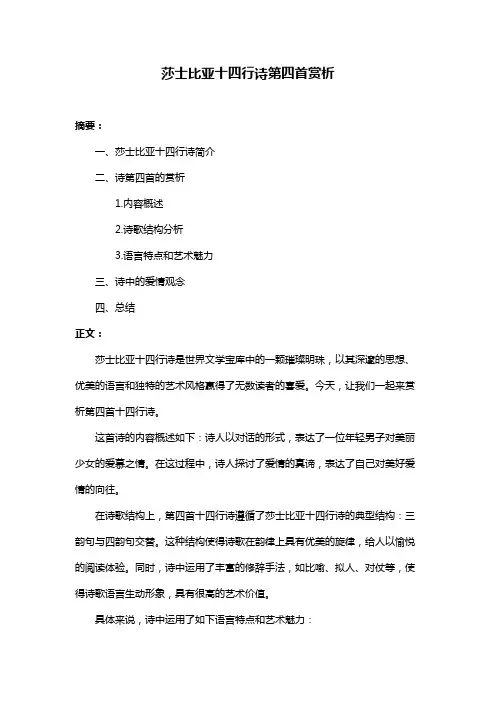
莎士比亚十四行诗第四首赏析摘要:一、莎士比亚十四行诗简介二、诗第四首的赏析1.内容概述2.诗歌结构分析3.语言特点和艺术魅力三、诗中的爱情观念四、总结正文:莎士比亚十四行诗是世界文学宝库中的一颗璀璨明珠,以其深邃的思想、优美的语言和独特的艺术风格赢得了无数读者的喜爱。
今天,让我们一起来赏析第四首十四行诗。
这首诗的内容概述如下:诗人以对话的形式,表达了一位年轻男子对美丽少女的爱慕之情。
在这过程中,诗人探讨了爱情的真谛,表达了自己对美好爱情的向往。
在诗歌结构上,第四首十四行诗遵循了莎士比亚十四行诗的典型结构:三韵句与四韵句交替。
这种结构使得诗歌在韵律上具有优美的旋律,给人以愉悦的阅读体验。
同时,诗中运用了丰富的修辞手法,如比喻、拟人、对仗等,使得诗歌语言生动形象,具有很高的艺术价值。
具体来说,诗中运用了如下语言特点和艺术魅力:1.比喻:诗人将少女的美貌比喻为“夏日璀璨的阳光”,形象地展现了少女的魅力。
这种比喻使得爱情形象更加具体可感,令人陶醉。
2.拟人:诗人将爱情拟人化为一位翩翩起舞的少女,寓意着爱情的美好与灵动。
这种拟人手法使得爱情具有了生命力和感召力。
3.对仗:诗中大量运用了对仗句,如“夏日璀璨的阳光”与“翩翩起舞的少女”,形成了优美的语言韵律。
这种对仗不仅使诗歌在形式上美观,还使得内容更加丰富,深化了主题。
在诗中,莎士比亚表达了一种纯粹的爱情观念。
他认为爱情不应仅仅局限于外表的美丽,而应追求内心的美好。
这种爱情观念超越了时代和地域的限制,至今仍具有很强的现实意义。
总之,莎士比亚的第四首十四行诗以其独特的艺术风格和深刻的思想内涵,成为了世界文学宝库中一颗璀璨的明珠。
通过这首诗,我们可以感受到诗人对美好爱情的向往,同时也领略到了诗歌艺术的魅力。
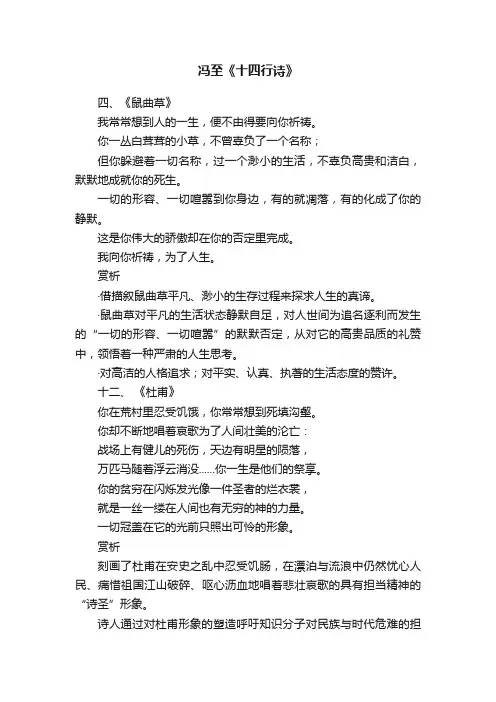
冯至《十四行诗》
四、《鼠曲草》
我常常想到人的一生,便不由得要向你祈祷。
你一丛白茸茸的小草,不曾辜负了一个名称;
但你躲避着一切名称,过一个渺小的生活,不辜负高贵和洁白,默默地成就你的死生。
一切的形容、一切喧嚣到你身边,有的就凋落,有的化成了你的静默。
这是你伟大的骄傲却在你的否定里完成。
我向你祈祷,为了人生。
赏析
·借描叙鼠曲草平凡、渺小的生存过程来探求人生的真谛。
·鼠曲草对平凡的生活状态静默自足,对人世间为追名逐利而发生的“一切的形容、一切喧嚣”的默默否定,从对它的高贵品质的礼赞中,领悟着一种严肃的人生思考。
·对高洁的人格追求;对平实、认真、执著的生活态度的赞许。
十二、《杜甫》
你在荒村里忍受饥饿,你常常想到死填沟壑。
你却不断地唱着哀歌为了人间壮美的沦亡:
战场上有健儿的死伤,天边有明星的陨落,
万匹马随着浮云消没......你一生是他们的祭享。
你的贫穷在闪烁发光像一件圣者的烂衣裳,
就是一丝一缕在人间也有无穷的神的力量。
一切冠盖在它的光前只照出可怜的形象。
赏析
刻画了杜甫在安史之乱中忍受饥肠,在漂泊与流浪中仍然忧心人民、痛惜祖国江山破碎、呕心沥血地唱着悲壮哀歌的具有担当精神的“诗圣”形象。
诗人通过对杜甫形象的塑造呼吁知识分子对民族与时代危难的担
当精神。
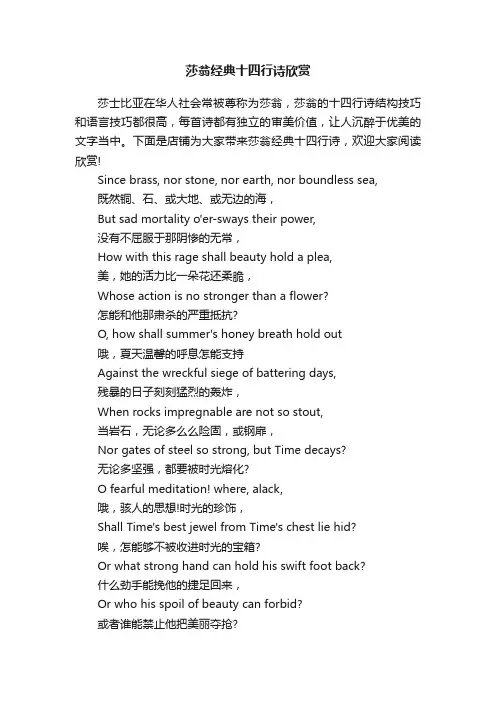
莎翁经典十四行诗欣赏莎士比亚在华人社会常被尊称为莎翁,莎翁的十四行诗结构技巧和语言技巧都很高,每首诗都有独立的审美价值,让人沉醉于优美的文字当中。
下面是店铺为大家带来莎翁经典十四行诗,欢迎大家阅读欣赏!Since brass, nor stone, nor earth, nor boundless sea,既然铜、石、或大地、或无边的海,But sad mortality o'er-sways their power,没有不屈服于那阴惨的无常,How with this rage shall beauty hold a plea,美,她的活力比一朵花还柔脆,Whose action is no stronger than a flower?怎能和他那肃杀的严重抵抗?O, how shall summer's honey breath hold out哦,夏天温馨的呼息怎能支持Against the wreckful siege of battering days,残暴的日子刻刻猛烈的轰炸,When rocks impregnable are not so stout,当岩石,无论多么么险固,或钢扉,Nor gates of steel so strong, but Time decays?无论多坚强,都要被时光熔化?O fearful meditation! where, alack,哦,骇人的思想!时光的珍饰,Shall Time's best jewel from Time's chest lie hid?唉,怎能够不被收进时光的宝箱?Or what strong hand can hold his swift foot back?什么劲手能挽他的捷足回来,Or who his spoil of beauty can forbid?或者谁能禁止他把美丽夺抢?O, none, unless this miracle have might,哦,没有谁,除非这奇迹有力量:That in black ink my love may still shine bright. 我的爱在翰墨里永久放光芒。
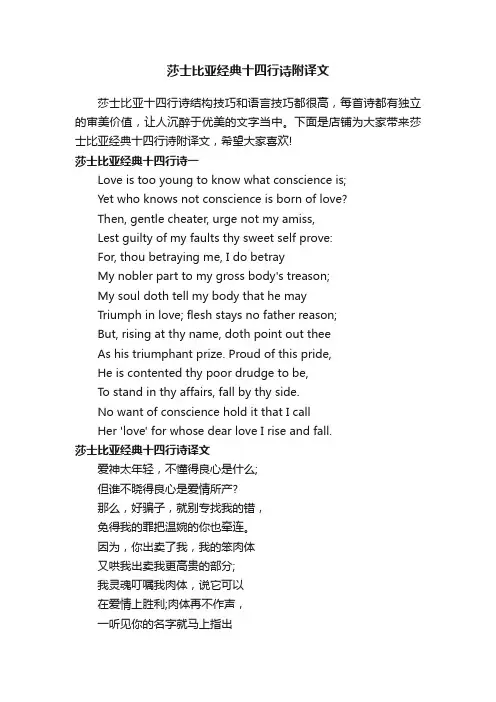
莎士比亚经典十四行诗附译文莎士比亚十四行诗结构技巧和语言技巧都很高,每首诗都有独立的审美价值,让人沉醉于优美的文字当中。
下面是店铺为大家带来莎士比亚经典十四行诗附译文,希望大家喜欢!莎士比亚经典十四行诗一Love is too young to know what conscience is;Yet who knows not conscience is born of love?Then, gentle cheater, urge not my amiss,Lest guilty of my faults thy sweet self prove:For, thou betraying me, I do betrayMy nobler part to my gross body's treason;My soul doth tell my body that he mayTriumph in love; flesh stays no father reason;But, rising at thy name, doth point out theeAs his triumphant prize. Proud of this pride,He is contented thy poor drudge to be,To stand in thy affairs, fall by thy side.No want of conscience hold it that I callHer 'love' for whose dear love I rise and fall.莎士比亚经典十四行诗译文爱神太年轻,不懂得良心是什么;但谁不晓得良心是爱情所产?那么,好骗子,就别专找我的错,免得我的罪把温婉的你也牵连。
因为,你出卖了我,我的笨肉体又哄我出卖我更高贵的部分;我灵魂叮嘱我肉体,说它可以在爱情上胜利;肉体再不作声,一听见你的名字就马上指出你是它的胜利品;它趾高气扬,死心蹋地作你最鄙贱的家奴,任你颐指气使,或倒在你身旁。
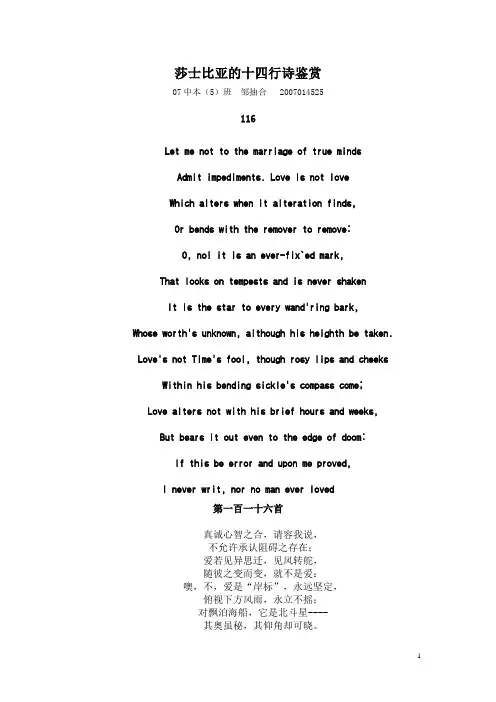
莎士比亚的十四行诗鉴赏07中本(5)班邹抽合 2007014525116Let me not to the marriage of true mindsAdmit impediments. Love is not loveWhich alters when it alteration finds,Or bends with the remover to remove:O, no! it is an ever-fix`ed mark,That looks on tempests and is never shakenIt is the star to every wand'ring bark, Whose worth's unknown, although his heighth be taken. Love's not Time's fool, though rosy lips and cheeks Within his bending sickle's compass come;Love alters not with his brief hours and weeks, But bears it out even to the edge of doom:If this be error and upon me proved,I never writ, nor no man ever loved第一百一十六首真诚心智之合,请容我说,不允许承认阻碍之存在;爱若见异思迁,见风转舵,随彼之变而变,就不是爱:噢,不,爱是“岸标”,永远坚定,俯视下方风雨,永立不摇;对飘泊海船,它是北斗星----其奥虽秘,其仰角却可晓。
爱情非时间之小丑,虽然红唇粉颊皆难逃其弯刀;爱情不随短暂岁月改变,而是坚忍持至世界终老。
此话若错,且于我身验获,说我无作,世间无人爱过。
结构性和语言美:十四行诗是来源于意大利民间的一种抒情短诗,文艺复兴初期时盛行于整个欧洲,其结构十分严谨,分为上下两部分,上段为八行,下段为六行,每行十一个音节,韵脚排列:abba abba cdc ded。
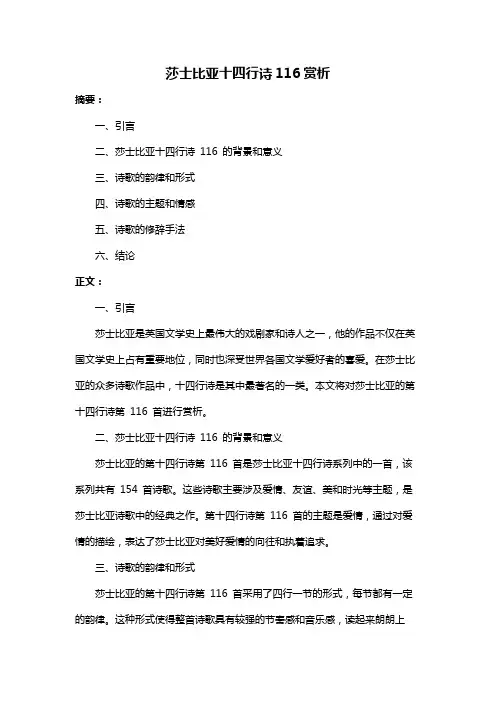
莎士比亚十四行诗116赏析摘要:一、引言二、莎士比亚十四行诗116 的背景和意义三、诗歌的韵律和形式四、诗歌的主题和情感五、诗歌的修辞手法六、结论正文:一、引言莎士比亚是英国文学史上最伟大的戏剧家和诗人之一,他的作品不仅在英国文学史上占有重要地位,同时也深受世界各国文学爱好者的喜爱。
在莎士比亚的众多诗歌作品中,十四行诗是其中最著名的一类。
本文将对莎士比亚的第十四行诗第116 首进行赏析。
二、莎士比亚十四行诗116 的背景和意义莎士比亚的第十四行诗第116 首是莎士比亚十四行诗系列中的一首,该系列共有154 首诗歌。
这些诗歌主要涉及爱情、友谊、美和时光等主题,是莎士比亚诗歌中的经典之作。
第十四行诗第116 首的主题是爱情,通过对爱情的描绘,表达了莎士比亚对美好爱情的向往和执着追求。
三、诗歌的韵律和形式莎士比亚的第十四行诗第116 首采用了四行一节的形式,每节都有一定的韵律。
这种形式使得整首诗歌具有较强的节奏感和音乐感,读起来朗朗上口,给人以美的享受。
同时,这种形式也便于诗人表达情感,展现了莎士比亚高超的艺术技巧。
四、诗歌的主题和情感第十四行诗第116 首的主题是爱情。
在诗歌中,莎士比亚通过对爱情的描绘,表达了自己对美好爱情的向往和执着追求。
诗人认为,爱情是一种美好而高尚的情感,它能使人们忘记痛苦,摆脱困境,让人们在美好的爱情中生活。
诗歌中充满了对爱情的赞美和渴望,表现了莎士比亚对爱情的热爱和执着追求。
五、诗歌的修辞手法在第十四行诗第116 首中,莎士比亚运用了许多修辞手法,如比喻、拟人、排比等,使得诗歌具有较强的表现力和感染力。
例如,“让我不期而遇的爱情,/像雨后的阳光照亮大地”,这里诗人运用了比喻手法,将爱情比作雨后的阳光,形象地表现了爱情的美好和温暖。
这些修辞手法的运用,使得诗歌更加生动形象,加深了读者对诗歌主题的理解。
六、结论莎士比亚的第十四行诗第116 首是一首主题为爱情的诗歌。
通过对爱情的描绘,表达了莎士比亚对美好爱情的向往和执着追求。
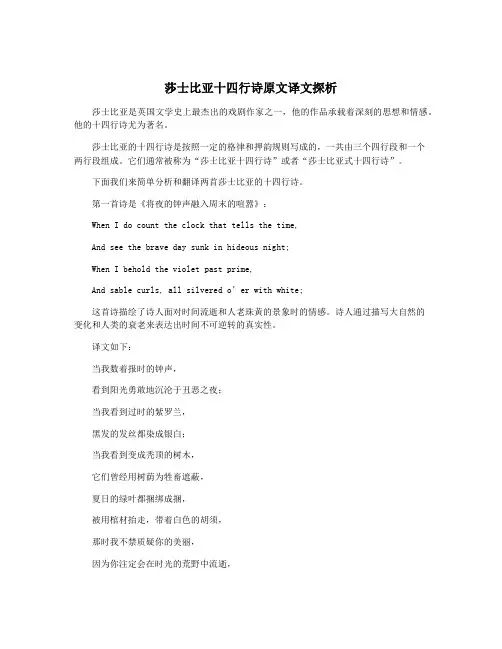
莎士比亚十四行诗原文译文探析莎士比亚是英国文学史上最杰出的戏剧作家之一,他的作品承载着深刻的思想和情感。
他的十四行诗尤为著名。
莎士比亚的十四行诗是按照一定的格律和押韵规则写成的,一共由三个四行段和一个两行段组成。
它们通常被称为“莎士比亚十四行诗”或者“莎士比亚式十四行诗”。
下面我们来简单分析和翻译两首莎士比亚的十四行诗。
第一首诗是《将夜的钟声融入周末的喧嚣》:When I do count the clock that tells the time,And see the brave day sunk in hideous night;When I behold the violet past prime,And sable curls, all silvered o’er with white;这首诗描绘了诗人面对时间流逝和人老珠黄的景象时的情感。
诗人通过描写大自然的变化和人类的衰老来表达出时间不可逆转的真实性。
译文如下:当我数着报时的钟声,看到阳光勇敢地沉沦于丑恶之夜;当我看到过时的紫罗兰,黑发的发丝都染成银白;当我看到变成秃顶的树木,它们曾经用树荫为牲畜遮蔽,夏日的绿叶都捆绑成捆,被用棺材抬走,带着白色的胡须,那时我不禁质疑你的美丽,因为你注定会在时光的荒野中流逝,因为甜美和美丽都会舍弃自己,并以比新生更快的速度去死亡;对抗时光的镰刀,没有什么可以防御,只有繁衍,等他把你带走时对抗他。
第二首诗是《希望赐我你的仁慈》:这首诗是莎士比亚对爱情的赞美和祝福。
诗人通过将恋人与夏日做比较,表达了恋人更加美丽和温顺的意思。
他认为,夏日的美好也有短暂的时限,而恋人的美丽将永不褪色,并且将永远存在于莎士比亚的诗歌中。
译文如下:我将你比作夏日的天空?你比夏日还要可爱和温和:狂风把五月里的新芽吹乱,夏日的租期时间太短暂:有时候,天空的目光太过火热,金色的面容总会变暗;美丽总有时候会减退,被时间或命运的改变剥夺光泽;但是你永恒的夏日不会褪色,也不会失去你应得的美丽;死亡也不能骄傲地说你陶醉在他的阴影里,当你通过永恒的诗行不断成长:只要人类还能呼吸,还能看见,这首诗将长存,它给了你生命。
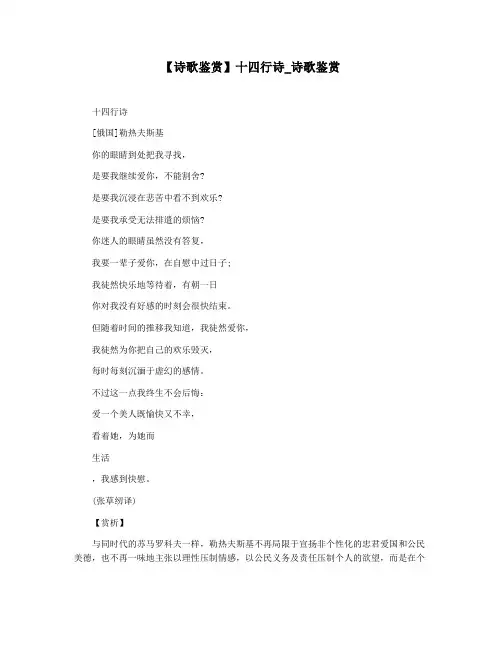
【诗歌鉴赏】十四行诗_诗歌鉴赏十四行诗[俄国]勒热夫斯基你的眼睛到处把我寻找,是要我继续爱你,不能割舍?是要我沉浸在悲苦中看不到欢乐?是要我承受无法排遣的烦恼?你迷人的眼睛虽然没有答复,我要一辈子爱你,在自慰中过日子;我徒然快乐地等待着,有朝一日你对我没有好感的时刻会很快结束。
但随着时间的推移我知道,我徒然爱你,我徒然为你把自己的欢乐毁灭,每时每刻沉湎于虚幻的感情。
不过这一点我终生不会后悔:爱一个美人既愉快又不幸,看着她,为她而生活,我感到快慰。
(张草纫译)【赏析】与同时代的苏马罗科夫一样,勒热夫斯基不再局限于宣扬非个性化的忠君爱国和公民美德,也不再一味地主张以理性压制情感,以公民义务及责任压制个人的欲望,而是在个性化的情感世界里进行开拓和发掘。
他的这首《十四行诗》同前一首《诗章》一样,表现了爱情的执著,同样也表现出了对未来时光的乐观主义的信念。
该诗的着眼点是目光。
第一诗节中,以对方的搜寻的目光展开想象和探究。
不知道这道眼光究竟含有什么意图。
不知道是否能从这束眼光中获得解救,使自己的心灵摆脱悲苦,重现欢乐,名言警句,使自己“无法排遣的烦恼”得以排遣。
可是,在第二诗节中,我们看到,诗人并没有从眼光中得到任何答案。
怎么办?是成天郁郁寡欢,沉陷在悲苦中不能自拔,还是振作精神,快乐地等待?诗人认为应该怀着乐观主义的精神进行等待。
经过时间的考验,他相信:“你对我没有好感的时刻会很快结束。
”即使随着时间的推移,最后等待到的仍是虚空一场,那么,抒情主人公同样“终生不会后悔”。
既然爱情是一种“痛苦的甜蜜”,那么,“爱一个美人既愉快又不幸”也是料想之中的事情了。
爱一个人,不在于爱的结果,而在于爱的过程,就像我们的生命一样,我们的生命的意义同样在于过程,并非是它的结果。
所以,诗的结尾一句“看着她,为她而生活,我感到快慰”,才是朴实的真理和爱情的意义。
勒热夫斯基支持苏马罗科夫的文学主张,是苏马罗科夫热切的崇拜者,而且,也是俄国18世纪中叶苏马罗科夫派的最有才华的诗人。
莎士比亚经典十四行诗欣赏莎士比亚是英国文学史上最杰出的戏剧家,也是西方文艺史上最杰出的作家之一,全世界最卓越的文学家之一。
他流传下来的作品包括37部戏剧、155首十四行诗、两首长叙事诗和其他诗歌。
他的戏剧有各种主要语言的译本,且表演次数远远超过其他任何戏剧家的作品。
下面是店铺为大家带来莎士比亚经典十四行诗欣赏,希望大家喜欢!莎士比亚经典十四行诗:When thou shalt be disposed to set me light,And place my merit in the eye of scorn,Upon thy side against myself I'll fight,And prove thee virtuous, though thou art forsworn.With mine own weakness being best acquainted,Upon thy part I can set down a storyOf faults conceal'd, wherein I am attainted,That thou in losing me shalt win much glory:And I by this will be a gainer too;For bending all my loving thoughts on thee,The injuries that to myself I do,Doing thee vantage, double-vantage me.Such is my love, to thee I so belong,That for thy right myself will bear all wrong.当你有一天下决心瞧我不起,用侮蔑的眼光衡量我的轻重,我将站在你那边打击我自己,证明你贤德,尽管你已经背盟。
对自己的弱点我既那么内行,我将为你的利益捏造我种种无人觉察的过失,把自己中伤;使你抛弃了我反而得到光荣:而我也可以借此而大有收获;因为我全部情思那么倾向你,我为自己所招惹的一切侮辱既对你有利,对我就加倍有利。
莎士比亚十四行诗116赏析【原创版】目录一、引言二、莎士比亚十四行诗 116 的背景和意义三、诗歌的韵律和结构四、诗歌的主题和情感表达五、诗歌的象征和隐喻六、结论正文一、引言莎士比亚是英国文学史上最伟大的戏剧家和诗人之一,他的作品深受全球读者的喜爱和推崇。
在莎士比亚的诗歌作品中,十四行诗是其中最著名的一类,被誉为“英文十四行诗的巅峰之作”。
在本文中,我们将对莎士比亚的第十四行诗第 116 首(Sonnet 116)进行赏析。
二、莎士比亚十四行诗 116 的背景和意义莎士比亚的十四行诗共有 154 首,其中大多数被认为是献给他的朋友或情人的。
第 116 首诗歌没有明确的标题,其主题主要是关于爱情的力量和持久性。
从诗歌的内容来看,它可能是献给一位特定的人,或者是用来表达诗人自己对爱情的看法。
三、诗歌的韵律和结构莎士比亚的十四行诗通常具有固定的韵律和结构,第 116 首诗歌也不例外。
它采用了四行一韵的押韵方式,每两行为一组,共分为三组。
在每组的最后一行,都使用了押韵,形成了韵律上的美感。
同时,这首诗歌也具有明显的节奏感,使得整首诗歌读起来顺畅、自然。
四、诗歌的主题和情感表达第 116 首诗歌的主题是爱情,诗人通过对爱情的描述,表达了自己对爱情的理解和感悟。
在诗歌的第一句,“让我们不在爱情的障碍面前屈服”,诗人明确表示了爱情的力量是强大的,足以克服一切困难和障碍。
接下来的几句话,诗人用生动的比喻来形容爱情的持久性和永恒性,表达了自己对爱情的信仰和追求。
五、诗歌的象征和隐喻在第 116 首诗歌中,诗人使用了许多象征和隐喻来表达自己对爱情的看法。
例如,诗中的“障碍”可以理解为生活中遇到的困难和挑战,而“真爱的心灵”则可以理解为对爱情的坚定信念。
通过这些象征和隐喻,诗人成功地表达了自己对爱情的坚定信仰和永恒追求。
六、结论莎士比亚的第十四行诗第 116 首是一首关于爱情的诗歌,诗人通过对爱情的描述,表达了自己对爱情的理解和感悟。
莎士比亚经典十四行诗附译文莎士比亚十四行诗结构技巧和语言技巧都很高,每首诗都有独立的审美价值,让人沉醉于优美的文字当中。
下面是店铺为大家带来莎士比亚经典十四行诗附译文,希望大家喜欢!莎士比亚经典十四行诗一Love is too young to know what conscience is;Yet who knows not conscience is born of love?Then, gentle cheater, urge not my amiss,Lest guilty of my faults thy sweet self prove:For, thou betraying me, I do betrayMy nobler part to my gross body's treason;My soul doth tell my body that he mayTriumph in love; flesh stays no father reason;But, rising at thy name, doth point out theeAs his triumphant prize. Proud of this pride,He is contented thy poor drudge to be,To stand in thy affairs, fall by thy side.No want of conscience hold it that I callHer 'love' for whose dear love I rise and fall.莎士比亚经典十四行诗译文爱神太年轻,不懂得良心是什么;但谁不晓得良心是爱情所产?那么,好骗子,就别专找我的错,免得我的罪把温婉的你也牵连。
因为,你出卖了我,我的笨肉体又哄我出卖我更高贵的部分;我灵魂叮嘱我肉体,说它可以在爱情上胜利;肉体再不作声,一听见你的名字就马上指出你是它的胜利品;它趾高气扬,死心蹋地作你最鄙贱的家奴,任你颐指气使,或倒在你身旁。
莎士比亚十四行诗全解析爱情与人生哲学莎士比亚十四行诗全解析:爱情与人生哲学莎士比亚(William Shakespeare)是世界上最伟大的戏剧家之一,他的作品中既有深邃的哲学思考,也有动人的爱情故事。
其中,他的十四行诗更是被广泛传诵,无论是描绘爱情的甜蜜、痴迷,还是讨论人生的喜怒哀乐,他都用精致的语言表达得淋漓尽致。
莎士比亚十四行诗,又称为“琴幺诗”(Sonnet),每首由14行组成,按照一定的韵律和格律写成。
这些诗的主题包罗万象,但其中最为广为人知的,就是关于爱情与人生哲学的探讨。
首先,莎士比亚的十四行诗揭示了爱情的复杂和多样性。
其中,有些诗描绘的是欢乐而美好的爱情,表达了爱人之间的甜蜜和促膝谈心的时刻。
例如,在《诗集18》中,莎士比亚用“夏天”的比喻,将爱情赋予了永恒的意义,他写道:“但将夏天长久保留,永恒夏天能为你存储。
”这种诗意赋予了爱情一种神圣和不朽的特质。
然而,在另一些十四行诗中,莎士比亚也表现出了爱情的痛苦和挣扎。
例如,在《诗集116》中,他谈到了真爱的力量,认为真爱可以抵抗时间的流逝和各种考验。
“爱不是爱,它不是从微光中变暗,它也不是时间到来的封印。
”这种对真爱的认知使得爱情被赋予了无法击垮的力量。
其次,莎士比亚的十四行诗也探讨了人生的意义和价值。
他思考了人类存在的目的和我们在这个世界上的意义。
例如,在《诗集66》中,莎士比亚描述了时间和熵的力量,他把时间比作吞噬者,吞噬一切,而死亡是无法逃离的结局。
然而,他在诗中也将人类的智慧,创造力和爱情看作是对抗时间的力量。
“那么,直到我走进黑夜,你将会活在歌声和歌颂中。
”这反映了莎士比亚对人类精神的力量和不朽的信仰。
莎士比亚的十四行诗还表达了对美的追求和对真实情感的敏感。
他运用了丰富的比喻、隐喻和修辞手法,使得诗句饱含着情感和意境。
他的诗意境,千变万化,有时是恬静的自然景色,有时是激情澎湃的盛宴。
无论是描绘一朵绽放的花朵,还是抒发对亲密关系的渴望,莎士比亚的诗句总是以充满生命力和美感的形象吸引着读者。
莎士比亚经典十四行诗带翻译莎士比亚的十四行诗已令读者叹为观止,极大地影响了他那个时代甚至于如今的文人和文学爱好者,给人真、善、美的享受和心灵的启迪。
那么你想欣赏一下莎士比亚的经典十四行诗吗?下面是店铺为大家带来莎士比亚经典十四行诗带翻译,欢迎大家阅读!Ah! wherefore with infection should he live,唉,我的爱为什么要和臭腐同居,And with his presence grace impiety,把他的绰约的丰姿让人亵渎,That sin by him advantage should achieve以至罪恶得以和他结成伴侣,And lace itself with his society?涂上纯洁的外表来眩耀耳目?Why should false painting imitate his cheek骗人的脂粉为什么要替他写真,And steal dead seeing of his living hue?从他的奕奕神采偷取死形似?Why should poor beauty indirectly seek为什么,既然他是玫瑰花的真身,Roses of shadow, since his rose is true?可怜的美还要找玫瑰的影子?Why should he live, now Nature bankrupt is,为什么他得活着,当造化破了产,Beggar'd of blood to blush through lively veins?缺乏鲜血去灌注淡红的脉络?For she hath no excheckr now but his,因为造化现在只有他作富源,And, proud of many, lives upon his gains.自夸富有,却靠他的利润过活。
O, him she stores, to show what wealth she had 哦,她珍藏他,为使荒歉的今天In days long since, before these last so bad.认识从前曾有过怎样的丰年。
Shakespeare's Sonnets Sonnet 1 From fairest creatures we desire increase, That thereby beauty'rose might never die, But as the riper should by time decease, His tender heir might bear his memory; But thou,contracted to thine own bright eyes, Feed'st thy light's flame with self-substantial fuel, Making a famine where abundance lies, Thyself thy foe,to thy sweet self too cruel. Thou that art now the world's fresh ornament, And only herald to the gaudy spring, Within thine own bud buriest thy content, And,tender churl,mak'st waste in niggarding. Pity the world,or else this glutton be, To eat the world's due,by the grave and thee. 对于美的生命我们愿它繁殖, 好让艳丽的玫瑰永不凋谢, 但熟透了的果实随时都会殒失, 后来者理当承继他的遗业。 可是你只与自己的眼睛订婚, 用自身作燃料烧炼出双眸的光焰, 于是便在丰饶的田野上酿出了饥馑, 你与自己过不去,对自己过分狠残。 如今你才能预报绚丽的春光。 你却在你的花蕾里埋葬自己, 温柔的蛮子用吝啬酿造蛮荒。 可怜这世界吧,莫让你和坟墓 吞噬掉人间原有的一切美好事物。 注释:2.That 以便,等同于so that。
3.riper 成熟的玫瑰。 5-8.thou,thine,thy,thyself相当于现代英语中的you,your,yourself,thy和thine是物主代词,只是thine用在以元音开头的词前面。
5.contracted 与...签合同的,与...订婚的。 6.Feed'st 在当时的英语中,当主语是第二人称单数thou时,在一般现在时中要在动词后加屈折词尾-est,正如在现代英语中如果主语是第三人称单数,一般现在时动词后要加-s一样。这里的feed'st本来应该是feedest,两个音节,省略feedest中的e是为了减少一个音节,这是格律的需要。 9-11.这三行的基本结构是Thou buriest thy content within thine own bud; that...gaudy spring是定语从句,修饰第9行中的Thou。
9.Thou that art在莎士比亚时代的英语中,当主语是thou时,动词be的一般现在是art,所以Thou that art 就是You who are。
10.herald 使者。 11.buriest 参见第6行中feed'st的注解。 12.churl 吝啬鬼,小气鬼。 niggard 动词,吝啬,小气。
13.glutton 贪吃的人。 14.the world'due 你的孩子,你因为不结婚生子而前世界的东西。 【欣赏】 莎士比亚《十四行诗》的1-17首形成一组,具有同一主题,都是诗人劝他的青年好友应该结婚的。因为,时间在改变一切,他那美的形貌也会消逝;只有结婚生育,才能在后代的身上永驻青春。从这组诗里,我们得识诗人那积极进取的人生哲理与现实主义精神。
开篇的十七首诗,主题随同,但是莎氏以不同的譬喻,从不同的角度,提炼、抒发为深沉的诗。
这第一首,诗人开宗明义地提出:熟透了的东西随时会殒落,血亲后嗣就该继承 他的遗业,要美的生命不断繁衍孳生,艳丽的玫瑰才不会凋谢。这是自然法则,也启示着现实中人应步的常道。但是朋友,你却不去寻结连理,只独钟其身,恰似和自己的眼睛订婚,燃尽自身,也只能烧炼出双眸的光焰,而不能把你的美传诸后人。这是和自己作对,就会在丰饶的田野上酿出了饥馑。你本是天地的精华,鲜艳的珍品,自应婚娶,生育美的后代,为灿烂的春天开路。而你却不肯与美人结合,愿在自身的花蕾里埋葬了自己。这种自怜的吝啬,酿成了毁灭的浪费,该有多么可惜与可叹啊!所以,诗人于最后剀切陈情:亲爱的朋友,可怜这世界吧,你不能违背自然规律,把世界应得的统统让坟墓吞去,和你一同消逝。 这诗蕴含着文艺复兴时代,一个人文主义者赤诚的现实主义精神。您听到了吗,诗人在为春天开路,为美的永驻而呐喊。 第一首第五行中,伊丽莎白时代的人认为,眼睛如同太阳一样,可放射出光焰。莎诗中多处提到眼睛时,均寓此义(如第33首第2行)。
Sonnet 2 When forty winters shall besiege thy brow, And dig deep trenches in thy bearty's fietd, Thy youth's proud livery,so gaz'd on now. Will be a tatter'd weed of sman worth held, 4 Then being ask'd where all thy beauty lies, Where all the treasure of thy lusty days; To say within thine own deep--sunken eyes, Were an all--eating shame,and thriftless praise. 8 How much more praise deserv'd thy bearty's use, If thou couldst answer,this fair child of mine Shall sum my count,and make my old excuse, Proving his beauty by succession thine. 12 This were to be new made when thou art old, And see thy blood warm when thou feel'st it cold. 当四十个冬天围攻你的容光, 在你美的额头掘出深深的沟堑, 你如今令人瞩目的青春华装, 将变为不值几文的破破烂烂。 那时有人问起你的美归何处? 你壮年的一切瑰宝哪里去了? 回答是在你深深凹陷的双目, 藏着无益的赞誉与贪欲的羞涩。 你那美的归宿更应得到赏识, 如果你能够说:“我的俊美儿童 将汇总我的账目,代致我老迈的歉意,” 来证明他的美正是你血统的继承。 你老了尚有第二个青春, 垂冷的血液也将得以重温。
注释:1 forty 泛指“许多”。winter 指“年”。besiege 包围。brow 前额。 2 trench 沟,指“皱纹”。 field(fietd):战场。 3 proud (指事物)华丽的。 livery 衣服。 so gazed on now 以gazed为中心的过去分词短语,作定语,修饰前面的livery,意思是“现在备受瞩目的”。 4 tattered 破烂的 weed 衣服 of small worth held 以held为中心词的过去分词短语,作定语,修饰前面的weed,正常语序是held of small worth。 hold 认为 of small worth 具有很小的价值,几乎没有价值。 5 being asked 现在分词短语做时间状语。 6 lusty 健康的,强壮的,精力旺盛的。 7 deep-sunken eyes 深陷的眼睛。 8 were 虚拟式,相当于would be。 an all-eating shame 一种耻辱,说明你吞噬了一切。 thriftless 没有价值的,无用的。 9 thy beauty's use 你对你的美貌的使用,也就是利用美貌来结婚生子。在该行中thy beauty's use是主语,how much more praise是宾语。 12 succession 继承,法律术语。在莎士比亚的十四行诗中法律术语经常出现。 13 This 指第12行中的thine,也就是thy beauty。 were与第8行中的were相同,即相当于would be。 第4句,在古英语中“sman”即“small”。 11 sum my count 结清我的账目。 count 账目。 make my old excuse 当我年老时证明我曾经美貌,Ingram和Redpath的解释是in my old age justify by his existence my having lived. 【欣赏】 岁月易逝,青春难驻。一个正视人生的智者,正当风华正茂之年,自会重视个人修养,永葆美的形貌;由于自然规律是难以违抗的,青春过了,衰老随至,四十个冬天就会在你的“田头”(额头)上刻出深的沟堑,你那引人注目的堂堂形貌,也将色衰变异。有人问起,你的美归何处?那里去寻觅你壮年时的一切瑰宝?如果你对美贪婪自珍,守身独处,你将无言以对,一任往日的神采隐入深陷的双目中。设若你善于对待自己的华美,不人生正道,就能够心安理得地说,宽恕我失去了上苍赐予的美好容貌吧,我膝下美丽的儿童,会总结我的帐,把我的损失补上;他秉承我的血统,是我受之于天的美的继承人。这正是结婚生息的皇皇正道,子嗣使你在垂老之年迎来了第二个春天,冷了的血液也得到重温。 请注意,诗人连续用了几个将来时态的助动词:“当四十个冬天”(When forty winters)、“将变为......破破烂烂”(Will be a tatter'd weed of......)、“那时候有人问起”(then being ask'd)、“将汇总我的账目”(Shall sum my count)、“当你......”(When thou art old/when thou feel'st it cold)。这正是莎士比亚直面自然“To hold the mirror up to nature”的学说在诗作中的使用。人们应该重视未来,衰老并不可怕,事业有成,后事有继,便可笑对苍天。
Sonnet 3 Look in thy glass and tell the face thou viewest, Now is the time that face should form another, Whose fresh repair if now thou not renewest, Thou dost beguile the world,unbless some mother. 4 For where is she so fair whose unesr'd womb Disdains the tillage of thy husbandry? Or who is he so fond will be the tomb Of his self--love to stop posterity? 8